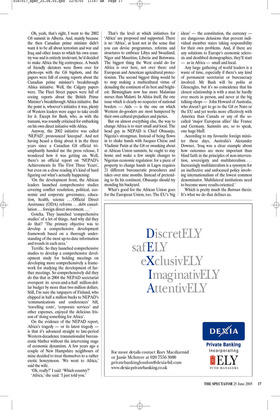Oh, yeah, that’s right, I went to the 2002 G8
summit in Alberta. And, mainly because the then Canadian prime minister didn’t want it to be all about terrorism and war and Iraq and other issues to which his own country was and is entirely irrelevant, he’d decided to make Africa the big centrepiece. A bunch of friendly dictators were flown over for photo-ops with the G8 bigshots, and the papers were full of cooing reports about the Canadian prime minister’s breakthrough Africa initiative. Well, the Calgary papers were. The Fleet Street papers were full of cooing reports about the British Prime Minister’s breakthrough Africa initiative. But the point is, whoever’s initiative it was, plenty of Western leaders were eager to take credit for it. Except for Bush, who, as with the tsunami, was roundly criticised for embarking on his own direct initiative with Africa.
Anyway, the 2002 initiative was called ‘NEPAD’, pronounced ‘kneepad’. And not having heard a thing about it in the three years since a Canadian G8 official triumphantly handed me the press release, I wondered how it was getting on. Well, there’s an official report on ‘NEPAD’s Achievements In The First Three Years’, but even on a close reading it’s kind of hard figuring out what’s actually happening: ‘On the development front, the African leaders launched comprehensive studies covering conflict resolution, political, economic and corporate governance, education, health, science ...Official Direct Assistance (ODA) reforms ... debt cancellation ... foreign direct investment.... ’ Gotcha. They launched ‘comprehensive studies’ of a lot of things. And why did they do that? ‘The primary objective was to develop a comprehensive development framework based on a thorough understanding of the most up-to-date information and trends in each area.’ Terrific. So they launched comprehensive studies to develop a comprehensive development study for holding meetings on developing more comprehensively a framework for studying the development of further meetings. So comprehensively did they do this that in 2004 the NEPAD secretariat overspent its seven-and-a-half million-dollar budget by more than two million dollars. Still, I’m sure the taxpayers of Finland, who chipped in half a million bucks to NEPAD’s ‘communications and conferences’ bill, ‘travelling costs’, ‘corporate services’ and other expenses, enjoyed the delicious frisson of ‘doing something for Africa’.
On the evidence of the NEPAD report, Africa’s tragedy — or its latest tragedy is that it’s advanced straight to late-period Western-decadence transnationalist bureaucratic blather without the intervening stage of economic dynamism. A few years ago a couple of New Hampshire neighbours of mine decided to treat themselves to a rather exotic honeymoon. ‘We went to Africa,’ said the wife.
‘Oh, really?’ I said. ‘Which country?’ ‘Africa,’ she said. ‘I just told you.’ That’s the level at which initiatives for ‘Africa’ are proposed and supported. There is no ‘Africa’, at least not in the sense that you can devise programmes, reforms and structures to embrace Libya and Swaziland, Niger and Mauritius, Liberia and Botswana. The biggest thing the West could do for Africa is over here, not over there: end European and American agricultural protectionism. The second biggest thing would be to stop making a multicultural virtue of denuding the continent of its best and brightest: Birmingham now has more Malawian nurses than Malawi. In Africa itself, the one issue which is clearly no respecter of national borders — Aids — is the one on which Western do-gooders are most hampered by their own cultural prejudices and pieties.
But on almost everything else, the way to change Africa is to start small and local. The head guy in NEPAD is Chief Obasanjo, Nigeria’s strongman. Instead of being flown in to shake hands with Jacques Chirac and Vladimir Putin at the G8 or swanking about at African Union summits, he ought to stay home and make a few simple changes to Nigerian economic regulation: for a piece of property to change hands in Lagos requires 21 different bureaucratic procedures and takes over nine months. Instead of pretending to fix his continent, Obasanjo should try mending his backyard.
What’s good for the African Union goes for the European Union, too. The EU’s ‘big ideas’ — the constitution, the currency are dangerous delusions that prevent individual member states taking responsibility for their own problems. And, if there are any solutions to Europe’s economic sclerosis and deathbed demographics, they’ll start — as in Africa — small and local.
Any large gathering of world leaders is a waste of time, especially if there’s any kind of permanent secretariat or bureaucracy involved. Mr Bush will be polite at Gleneagles, but it’s no coincidence that his closest relationship is with a man he hardly ever meets in person, and never at the big talking-shops — John Howard of Australia, who doesn’t get to go to the G8 or Nato or the EU and yet works more effectively with America than Canada or any of the socalled ‘major European allies’ like France and Germany. Summits are, so to speak, one huge bluff.
According to my favourite foreign minister these days, Australia’s Alexander Downer, ‘Iraq was a clear example about how outcomes are more important than blind faith in the principles of non-intervention, sovereignty and multilateralism.... Increasingly multilateralism is a synonym for an ineffective and unfocused policy involving internationalism of the lowest common denominator. Multilateral institutions need to become more results-oriented.’ Which is pretty much the Batman thesis: It’s what we do that defines us.


































































 Previous page
Previous page